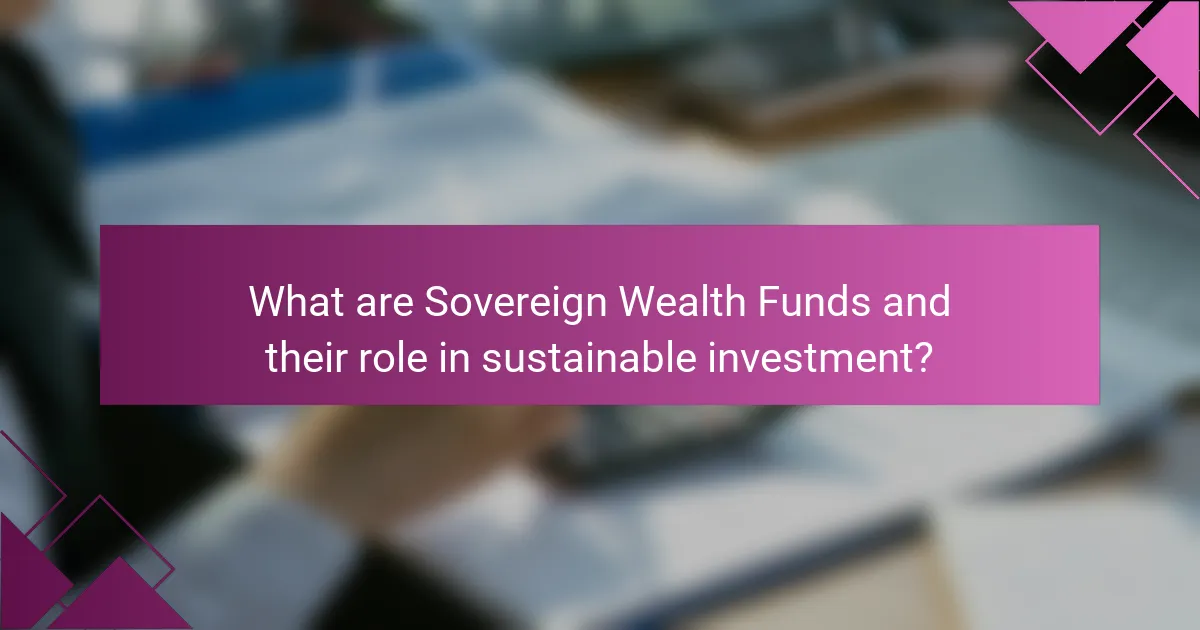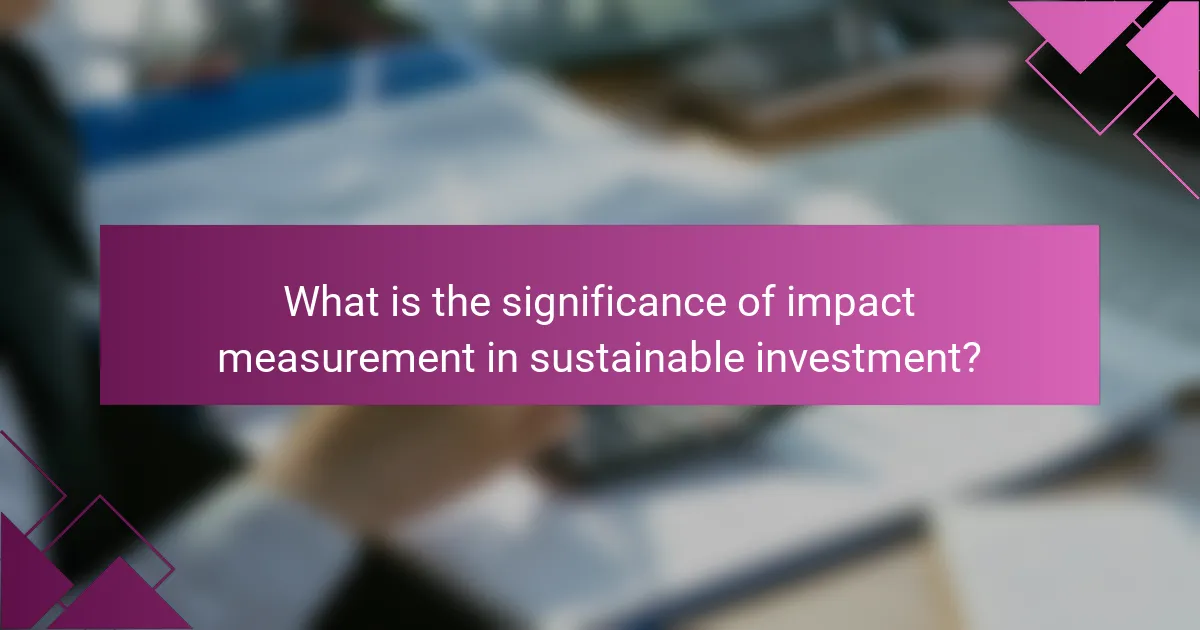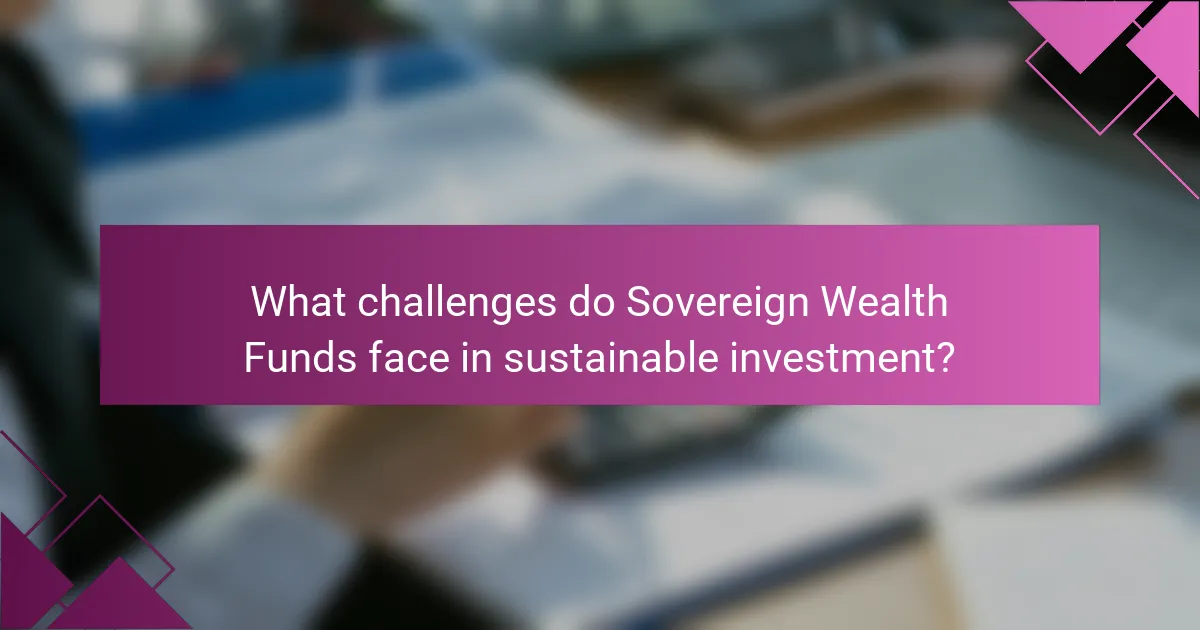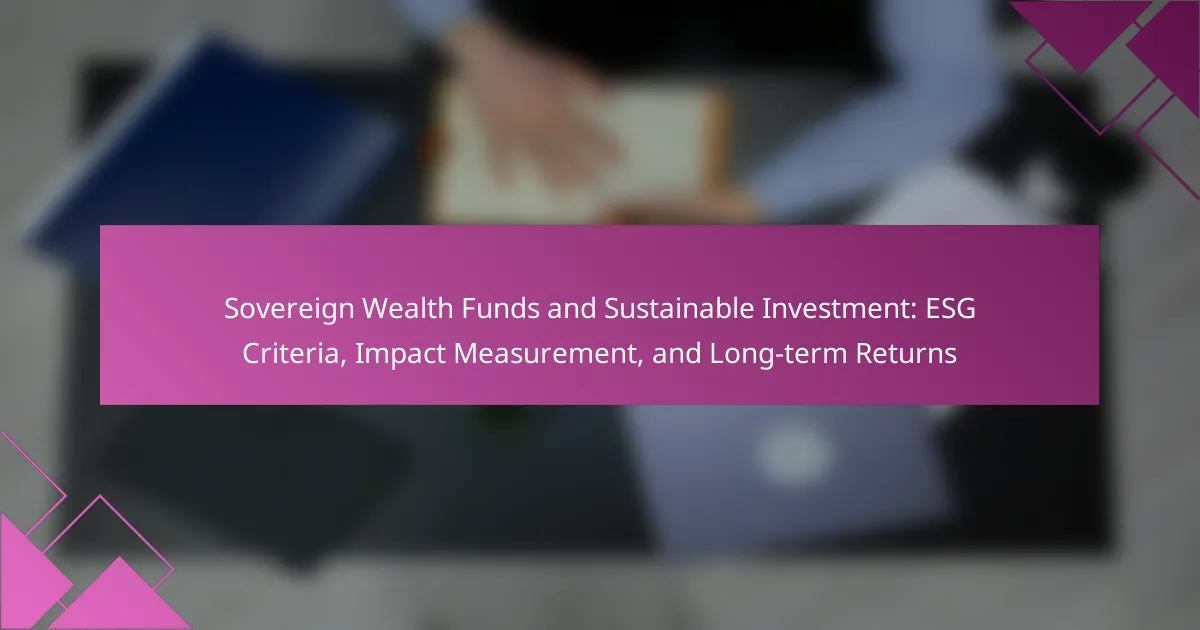
What are Sovereign Wealth Funds and their role in sustainable investment?
Sovereign Wealth Funds (SWFs) are state-owned investment funds that manage national savings for various purposes. They invest in a diverse range of assets, including stocks, bonds, real estate, and infrastructure. SWFs play a crucial role in sustainable investment by integrating Environmental, Social, and Governance (ESG) criteria into their investment strategies.
This integration aims to promote long-term value creation while addressing global challenges such as climate change and social inequality. Many SWFs have committed to sustainable investment practices, reflecting a growing recognition of their responsibility to future generations. For example, the Norwegian Government Pension Fund Global, one of the largest SWFs, has divested from companies with poor environmental records.
Their influence in the financial markets allows SWFs to drive positive change by prioritizing investments in sustainable industries. As of 2021, over $30 trillion in assets were managed by SWFs globally, highlighting their significant impact on the investment landscape.
How do Sovereign Wealth Funds operate in the context of sustainable investment?
Sovereign Wealth Funds (SWFs) operate in the context of sustainable investment by integrating Environmental, Social, and Governance (ESG) criteria into their investment strategies. This approach enables SWFs to assess the sustainability and ethical impact of their investments. Many SWFs prioritize long-term returns, aligning their portfolios with sustainable practices. For example, the Norwegian Government Pension Fund Global excludes companies involved in severe environmental damage. Additionally, SWFs often engage in active ownership, influencing companies to adopt sustainable practices. Reports indicate that SWFs are increasingly focusing on renewable energy and sustainable infrastructure. This shift reflects a growing recognition of the financial risks associated with climate change and social issues. Overall, SWFs are positioning themselves as leaders in promoting sustainable investment globally.
What are the key characteristics of Sovereign Wealth Funds?
Sovereign Wealth Funds (SWFs) are state-owned investment funds. They manage national savings for various purposes, including stabilization and future generations. SWFs typically invest in a diversified portfolio, including equities, bonds, real estate, and alternative assets. They are characterized by their long-term investment horizon. Many SWFs aim to generate returns that exceed inflation over time. They often have significant capital, allowing for large-scale investments. Transparency and governance vary among SWFs, influencing their investment strategies. Some SWFs incorporate Environmental, Social, and Governance (ESG) criteria into their investment decisions.
How do Sovereign Wealth Funds differ from other investment vehicles?
Sovereign Wealth Funds (SWFs) differ from other investment vehicles primarily in their ownership structure. SWFs are state-owned investment funds or entities that manage national savings for the purpose of investment. They typically invest in a variety of asset classes, including stocks, bonds, real estate, and infrastructure. Unlike private investment funds, SWFs are funded by government revenues, such as surplus reserves from commodity exports or foreign exchange earnings.
Additionally, SWFs often have a long-term investment horizon, which allows them to focus on sustainable growth rather than short-term gains. This is different from many hedge funds or private equity funds that may prioritize immediate returns. According to the Sovereign Wealth Fund Institute, as of 2021, there are over 90 SWFs globally, managing assets worth over $9 trillion. This significant capital enables them to influence markets and engage in strategic investments that align with national interests.
In summary, the unique characteristics of SWFs include their state ownership, long-term investment strategies, and substantial capital resources, setting them apart from other investment vehicles.
Why is ESG criteria important for Sovereign Wealth Funds?
ESG criteria are important for Sovereign Wealth Funds because they guide investment decisions towards sustainable and responsible practices. These funds manage large pools of capital and have a significant impact on global markets. Incorporating ESG criteria helps mitigate risks associated with environmental, social, and governance factors. For example, investments in companies with poor ESG performance may lead to financial losses due to regulatory penalties or reputational damage. Additionally, studies show that companies with strong ESG practices often outperform their peers financially over the long term. This trend highlights the potential for better returns on investments aligned with sustainable practices. Sovereign Wealth Funds that prioritize ESG criteria can also enhance their reputation and attract more investors. Overall, integrating ESG factors is essential for long-term value creation and risk management in Sovereign Wealth Funds.
What does ESG stand for and how is it defined?
ESG stands for Environmental, Social, and Governance. It is a set of criteria used to evaluate a company’s operations and performance. Environmental criteria examine how a company manages risks and opportunities related to environmental challenges. Social criteria assess how it manages relationships with employees, suppliers, customers, and communities. Governance criteria deal with a company’s leadership, executive pay, audits, internal controls, and shareholder rights. ESG factors are increasingly used by investors to screen potential investments and to assess the sustainability and societal impact of their investments.
How do Sovereign Wealth Funds implement ESG criteria in their investment strategies?
Sovereign Wealth Funds implement ESG criteria by integrating environmental, social, and governance factors into their investment decision-making processes. They conduct thorough assessments of potential investments based on ESG metrics. This includes evaluating carbon footprints, labor practices, and board diversity. Many funds adopt specific ESG frameworks or guidelines to standardize their evaluations. For instance, the Principles for Responsible Investment (PRI) is often utilized. Additionally, funds may engage with companies to encourage better ESG practices. They also report on their ESG performance to stakeholders regularly. This approach aligns with their long-term investment goals and risk management strategies. By doing so, they aim to enhance their overall portfolio sustainability and performance.

What is the significance of impact measurement in sustainable investment?
Impact measurement is crucial in sustainable investment as it quantifies the social and environmental outcomes of investments. This process allows investors to assess the effectiveness of their capital in achieving positive change. Accurate impact measurement provides transparency and accountability, which are essential for attracting more capital to sustainable projects. It also helps in aligning investment strategies with the United Nations Sustainable Development Goals (SDGs). Furthermore, studies show that investments with verified positive impacts can lead to better long-term financial returns. For instance, a report by the Global Impact Investing Network highlights that 88% of impact investors expect to achieve market-rate returns alongside measurable social impact.
How do Sovereign Wealth Funds measure the impact of their investments?
Sovereign Wealth Funds measure the impact of their investments through quantitative and qualitative metrics. They assess financial returns alongside environmental, social, and governance (ESG) criteria. Metrics include carbon footprint reduction, job creation, and community development. They also utilize frameworks like the Global Reporting Initiative for standardization. Regular performance evaluations track progress against set benchmarks. Third-party assessments provide independent verification of impact claims. Reports are published to enhance transparency and accountability. These methods ensure investments align with long-term sustainability goals.
What metrics are commonly used for impact measurement?
Common metrics used for impact measurement include Social Return on Investment (SROI), Environmental Impact Assessments (EIA), and the Global Impact Investing Network (GIIN) metrics. SROI quantifies social, environmental, and economic value created relative to investment. EIAs evaluate the environmental consequences of projects or investments. GIIN metrics focus on measuring impact across various sectors, providing standardized assessments. These metrics help investors and organizations gauge the effectiveness of their initiatives in achieving sustainable outcomes.
How does impact measurement influence investment decisions?
Impact measurement significantly influences investment decisions by quantifying the social and environmental outcomes of investments. Investors increasingly prioritize sustainability, seeking to align portfolios with positive impact. This alignment is driven by the desire for long-term financial returns and risk mitigation. Research shows that companies with strong ESG performance often exhibit lower volatility and better financial performance. A study by MSCI found that high ESG-rated companies outperformed their low-rated counterparts during market downturns. Thus, effective impact measurement provides data that informs investment strategies, guiding capital towards sustainable initiatives. This focus on measurable impact enhances accountability and transparency in investment processes.
Why are long-term returns critical for Sovereign Wealth Funds?
Long-term returns are critical for Sovereign Wealth Funds because they ensure financial stability and growth over time. These funds typically manage national savings and investments, aiming to provide for future generations. Long-term investment strategies allow these funds to ride out market volatility. Historical data shows that equities tend to yield higher returns over extended periods. For instance, the average annual return of global equities has been around 7% after inflation over the last century. Additionally, Sovereign Wealth Funds often have obligations that span decades, such as funding pensions or public services. This necessitates a focus on sustainable growth rather than short-term gains. By prioritizing long-term returns, these funds can fulfill their mandate effectively and contribute to national economic stability.
What strategies do Sovereign Wealth Funds use to achieve long-term returns?
Sovereign Wealth Funds (SWFs) use diversification and long-term investment strategies to achieve sustainable returns. They allocate assets across various sectors and geographic regions. This reduces risk and enhances potential returns. Additionally, SWFs often invest in infrastructure and real estate. These investments typically yield stable cash flows over time. They also incorporate Environmental, Social, and Governance (ESG) criteria into their investment decisions. This approach aligns with global sustainability trends and attracts responsible investors. Historical data shows that SWFs with strong ESG practices often outperform their peers. For instance, the Norwegian Government Pension Fund Global has consistently demonstrated this through its responsible investment strategy.
How do sustainable investments contribute to long-term financial performance?
Sustainable investments contribute to long-term financial performance by aligning financial returns with environmental, social, and governance (ESG) criteria. Companies that prioritize sustainability often exhibit lower operational risks and enhanced reputation. A Morgan Stanley report found that sustainable equity funds outperformed traditional funds by 4.3% in 2020. Additionally, companies with robust ESG practices tend to attract more investment, leading to better capital access and lower costs. Research from Harvard Business School indicates that firms with high sustainability ratings have lower volatility and higher profitability over time. Thus, sustainable investments not only support ethical practices but also enhance financial resilience and growth.

What challenges do Sovereign Wealth Funds face in sustainable investment?
Sovereign Wealth Funds face several challenges in sustainable investment. One major challenge is the lack of standardized ESG criteria. Different frameworks lead to inconsistencies in evaluating investments. Another challenge is balancing financial returns with sustainability goals. Funds often prioritize short-term gains over long-term sustainability. Additionally, there is pressure from stakeholders for transparency in investment practices. This can complicate decision-making processes. Limited data on the impact of sustainable investments further complicates assessments. Lastly, geopolitical factors can influence investment strategies, creating uncertainty in sustainable commitments.
How do market fluctuations affect Sovereign Wealth Funds’ sustainable investments?
Market fluctuations significantly impact Sovereign Wealth Funds’ sustainable investments. These funds often allocate capital based on projected returns and risk assessments. When markets are volatile, the perceived risk of sustainable investments can increase. This may lead to reduced allocations to such investments as funds seek stability.
For instance, during economic downturns, funds may prioritize traditional investments that promise quicker returns. Conversely, in stable markets, there is typically a greater willingness to invest in sustainable projects. Historical data shows that during the 2008 financial crisis, many Sovereign Wealth Funds reduced their exposure to green investments.
This trend highlights a reactive approach to market conditions. Sustainable investments may be viewed as less liquid, further deterring investment during fluctuations. As a result, the long-term growth potential of sustainable sectors can be undermined by short-term market pressures.
What are the risks associated with ESG investments?
ESG investments carry several risks that can impact their performance. One major risk is regulatory risk, which arises from changing laws and regulations regarding environmental, social, and governance standards. Companies may face penalties or increased compliance costs if they fail to meet these evolving requirements.
Another risk is reputational risk, where companies linked to ESG failures can experience negative public perception. This can lead to decreased consumer trust and lower sales.
Market risk also affects ESG investments. The financial performance of ESG-focused companies can be influenced by broader market trends that may not align with their sustainability practices.
Lastly, there is the risk of greenwashing, where companies may falsely claim adherence to ESG principles. This can mislead investors and lead to financial losses when the truth is revealed.
According to a report from MSCI, companies with strong ESG practices can outperform their peers, but they are not immune to these risks.
How can Sovereign Wealth Funds mitigate these risks?
Sovereign Wealth Funds can mitigate risks by diversifying their investment portfolios. Diversification reduces exposure to any single asset class or market. This strategy helps in balancing potential losses with gains from other investments. Additionally, SWFs can adopt rigorous ESG criteria in their investment decisions. This approach aligns investments with sustainable practices, reducing reputational and regulatory risks.
Furthermore, SWFs can engage in active management of their assets. Active management allows for timely adjustments based on market conditions and emerging risks. Implementing robust risk assessment frameworks is also crucial. These frameworks enable SWFs to identify and evaluate potential risks systematically.
Moreover, SWFs can collaborate with other institutional investors. Collaboration can enhance knowledge sharing and risk management strategies. By investing in sustainable projects, SWFs contribute to long-term economic stability. This commitment can lead to more resilient financial returns over time.
What best practices can Sovereign Wealth Funds adopt for successful sustainable investment?
Sovereign Wealth Funds can adopt best practices such as integrating ESG criteria into investment strategies. This ensures alignment with sustainable development goals. Regularly measuring impact and performance is crucial. It allows funds to assess the effectiveness of their investments. Engaging with stakeholders enhances transparency and accountability. This builds trust and encourages responsible investing. Diversifying investments across sectors promotes resilience. It mitigates risks associated with market fluctuations. Finally, continuous education on sustainable finance trends is essential. This keeps funds informed and adaptable to evolving best practices.
How can collaboration with stakeholders enhance sustainable investment outcomes?
Collaboration with stakeholders enhances sustainable investment outcomes by fostering shared goals and resources. Engaging stakeholders allows for a comprehensive understanding of environmental, social, and governance (ESG) factors. This collective knowledge leads to better decision-making in investment strategies. Research shows that inclusive stakeholder engagement can improve risk management and increase investment returns. For instance, a study by the Global Sustainable Investment Alliance indicates that funds with strong stakeholder collaboration achieve higher long-term performance. Therefore, collaboration is crucial for aligning interests and maximizing sustainable investment benefits.
What role does transparency play in the success of sustainable investments?
Transparency is crucial for the success of sustainable investments. It fosters trust between investors and fund managers. Clear reporting on environmental, social, and governance (ESG) criteria enhances accountability. Investors are more likely to commit funds when they understand the impact of their investments. According to a 2020 study by the Global Sustainable Investment Alliance, transparency in reporting leads to increased investment in sustainable assets. This increase supports long-term returns and aligns with investors’ values. Transparency also helps mitigate risks associated with greenwashing. Therefore, it plays a vital role in driving sustainable investment success.
What are the future trends for Sovereign Wealth Funds in sustainable investment?
Sovereign Wealth Funds (SWFs) are increasingly prioritizing sustainable investment strategies. Future trends indicate a stronger focus on Environmental, Social, and Governance (ESG) criteria. This shift is driven by growing public demand for responsible investment practices. Additionally, SWFs are adopting impact measurement frameworks to assess their investments’ social and environmental outcomes. Many funds are also diversifying their portfolios to include renewable energy and sustainable infrastructure projects. Collaboration with private sector investors is expected to increase. Furthermore, regulatory pressures are prompting SWFs to disclose their sustainability practices more transparently. The integration of technology in investment analysis is likely to enhance decision-making in sustainable investments. These trends reflect a commitment to long-term returns aligned with global sustainability goals.
How might technological advancements impact Sovereign Wealth Funds’ investment strategies?
Technological advancements will significantly impact Sovereign Wealth Funds’ investment strategies. These advancements enhance data analytics capabilities. Improved analytics allow for better risk assessment and investment decision-making. Artificial intelligence can identify investment opportunities more efficiently. Machine learning algorithms analyze vast datasets for trends and insights. Blockchain technology increases transparency and security in transactions. Additionally, technology facilitates real-time monitoring of investments. This leads to more agile and responsive investment strategies. Overall, technology enables Sovereign Wealth Funds to optimize their portfolios for better long-term returns.
What emerging markets present opportunities for sustainable investment by Sovereign Wealth Funds?
Emerging markets that present opportunities for sustainable investment by Sovereign Wealth Funds include India, Brazil, and Southeast Asian nations. India is focusing on renewable energy and infrastructure development, with government initiatives supporting clean technology. Brazil offers opportunities in sustainable agriculture and forest conservation, critical for biodiversity. Southeast Asian countries, such as Vietnam and Indonesia, are investing in green finance and sustainable urban development. According to the Global Sustainable Investment Alliance, emerging markets are increasingly attracting ESG-focused investments due to their growth potential and commitment to sustainability.
Sovereign Wealth Funds (SWFs) are state-owned investment entities that manage national savings, focusing on diverse assets while integrating Environmental, Social, and Governance (ESG) criteria into their strategies. This article examines the role of SWFs in sustainable investment, highlighting their commitment to long-term value creation and impact measurement. Key discussions include the significance of ESG factors, challenges faced in sustainable investing, and the importance of transparency and collaboration with stakeholders. Additionally, the article explores future trends and emerging markets that offer opportunities for SWFs to enhance their sustainable investment portfolios.
